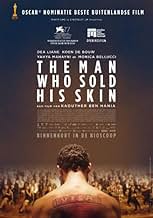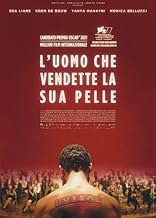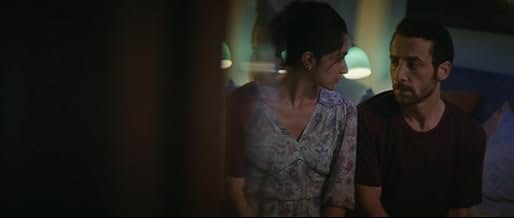NOTE IMDb
6,9/10
7,5 k
MA NOTE
Le voyage de Sam Ali, un Syrien qui a fui au Liban pour échapper à la guerre, dans l'espoir de rejoindre l'amour de sa vie à Paris.Le voyage de Sam Ali, un Syrien qui a fui au Liban pour échapper à la guerre, dans l'espoir de rejoindre l'amour de sa vie à Paris.Le voyage de Sam Ali, un Syrien qui a fui au Liban pour échapper à la guerre, dans l'espoir de rejoindre l'amour de sa vie à Paris.
- Réalisation
- Scénario
- Casting principal
- Nommé pour 1 Oscar
- 9 victoires et 12 nominations au total
Koen De Bouw
- Jeffrey Godefroi
- (as Koen de Bouw)
Avis à la une
I hadn't realised that was by a Tunisian director. She did a good job to get Syrians to play nearly all of the principal parts. It really irritates me when the accents don't match the supposed country when I watch an Arabic-language film and I always wonder why so many films make do with impersonations. I used to live in Syria, so it is even worse when the actors are playing (and failing) the various Syrian accents.
I was also pleased to see that there was very little propaganda against His Excellency Bashar al-Assad, the elected President of Syria. He was referred to as a dictator at one point; I wish the translation on the subtitles had said "Autarch" which might have been better. However, despite the freedoms experienced by Syrians before the attack on her, the results of the scene in the train during the marriage proposal and its subsequent sequels are wearily familiar as were the family connections used as a solution.
Life as a refugee was shown unflinchingly. I have had experience of some of the tricks and strategies used by migrants to stay alive - I live in a different Arab country now and see sub-Saharan immigrants at exhibitions where food will be served so they can get a meal for free just as Sam and his friends do in the film.
It's at one of these exhibitions that Sam's life changes. He makes a pact that will allow him to follow his love to Europe to fulfil a promise and a dream. He has contracted out his body.
Not everything goes smoothly, of course. There wouldn't have been a film if it had. That the hour and forty four minutes flew past is a testament to the power of the storyline and plot development. The last two twists in the final minutes of the film had me in the depths of despair; I'd seen the first one coming. What else would DAESH had done? There's another development after that which resolves the film completely.
I had had this waiting to be watched for a month or so. Last night was an ideal time to watch; I was relaxed and ready for it. I recommend the film.
I was also pleased to see that there was very little propaganda against His Excellency Bashar al-Assad, the elected President of Syria. He was referred to as a dictator at one point; I wish the translation on the subtitles had said "Autarch" which might have been better. However, despite the freedoms experienced by Syrians before the attack on her, the results of the scene in the train during the marriage proposal and its subsequent sequels are wearily familiar as were the family connections used as a solution.
Life as a refugee was shown unflinchingly. I have had experience of some of the tricks and strategies used by migrants to stay alive - I live in a different Arab country now and see sub-Saharan immigrants at exhibitions where food will be served so they can get a meal for free just as Sam and his friends do in the film.
It's at one of these exhibitions that Sam's life changes. He makes a pact that will allow him to follow his love to Europe to fulfil a promise and a dream. He has contracted out his body.
Not everything goes smoothly, of course. There wouldn't have been a film if it had. That the hour and forty four minutes flew past is a testament to the power of the storyline and plot development. The last two twists in the final minutes of the film had me in the depths of despair; I'd seen the first one coming. What else would DAESH had done? There's another development after that which resolves the film completely.
I had had this waiting to be watched for a month or so. Last night was an ideal time to watch; I was relaxed and ready for it. I recommend the film.
"The Man Who Sold His Skin," Tunisia's first ever International Feature Film nominee at the Academy Awards, reminded me a lot of the movie "Synonyms" from last year. Both are about men who have been exiled from their countries of origin -- in one the man is a Syrian refugee, in the other a young man self exiles himself from the oppressive military culture of Israel. In both films, the men find themselves turned into commodities by their adopted countries, welcomed only as much as they can prove themselves to be useful. I liked both films quite a lot, "Synonyms" probably a bit more, but "The Man Who Sold His Skin" is quite good in its own right.
It's apparently based on a true story, though I always take that claim with a grain of salt. The man at the film's center agrees to have his entire back tattooed with a visa that allows refugees to travel freely through Europe, which turns him into a living work of art on display in museums and galleries. The lack of narrative subtlety is compensated for by a striking visual style. This film looks beautiful, nearly every scene offering the viewer composition just begging to be admired. Indeed, at times it's almost a little too beautiful, too carefully composed, as if the director just couldn't help but make choices that would draw attention to themselves. But it's a sin I can forgive when the results are a movie that looks as good as this one does.
Grade: A.
It's apparently based on a true story, though I always take that claim with a grain of salt. The man at the film's center agrees to have his entire back tattooed with a visa that allows refugees to travel freely through Europe, which turns him into a living work of art on display in museums and galleries. The lack of narrative subtlety is compensated for by a striking visual style. This film looks beautiful, nearly every scene offering the viewer composition just begging to be admired. Indeed, at times it's almost a little too beautiful, too carefully composed, as if the director just couldn't help but make choices that would draw attention to themselves. But it's a sin I can forgive when the results are a movie that looks as good as this one does.
Grade: A.
Let's just keep in mind that this movie isn't the type of a satirical work that is meant to tackle its subject matter by probing it or offering a deeper understanding of the whole situation and, definitely, not to reach a resolution. It's rather more akin to a cautionary tale, or one that shines a spotlight on the social and political situations and what they entail, exposing the superficiality of them all by explicitly reflecting it on a seemingly unrelated surface, which is here art. Excuse my ignorance of the term that would spare me all that rambling. I just wanted to remind some people (myself included) who can easily mistake this for being too on-the-nose that it's actually intentionally so, the thing that could be clearly noticed through its self-awareness of its pretentiousness, and I couldn't imagine a more competent way to mirror that than espousing art.
The Man Who Sold His Skin revolves around a highly provocative subject of a Syrian refugee, Sam Ali, in Beirut who accepts a deal offered to him by a contemporary artist, Jeffrey Godefroi, to have his back turned into a living work of art in order to travel to Belgium. As a contemporary take on a Faustian deal, the movie truly shines. It's true this story is about a man who sells his skin (hence his identity) to the artist, Jeffrey, (he even mentioned that he sees himself as Mephistopheles) in return for "freedom," but here the protagonist is marked by a pronounced stigma, namely the Visa tattooed on his back, "this work of art bears the signature of the devil," said Mr. Waltz and his wife justifying the reason why they bought Sam. He became a flesh-and-blood example of the exploitation Syrian refugees, although he willingly became one, mainly to live with the love of his life, Abeer. That leads us to the main complaint I have with this movie: the love story, or rather the drama surrounds it.
The movie quickly makes us abandon any thought the story would be heavy on its prickly themes of human trafficking, exploitation and the commodification of people, declaring out loud it's a love story through and through. But here is the thing, the romantic dramedy elements here are too pedestrian and the characterizations severely lacking in nuance to keep me invested. Consequently, the movie drags quite often. The story also tries to stir a few emotional chords by the end, trying as hard as it can to bring out more of its potential to be a reflective drama. Suffice it to say, it falls flat on the emotional punch. What really bogged this movie down is its dense caustic encapsulation, which although it lends the social commentary the edge it needed, it definitely does seem completely discordant with both the dramatic and the romantic aspects, hindering the heart and levity from seeping out of the surface.
As art takes the centre stage, the cinematography doesn't skimp on its artistic ambitions. First movie that popped into my head watching the stunning, garish visuals in the scenes set in the gallery is Velvet Buzzsaw (Dan Gilroy's latest effort, also centred around art,) but instead of only serving its sole purpose of giving a hazardous sense, here it surpasses that by expressing the inner feelings of the characters. The compositions, in particular, that involved two or more characters resulted in some of the best shots I've seen in any movie from last year; they are truly eloquent when it comes to juxtaposing the characters' emotions and thoughts.
(6/10)
The Man Who Sold His Skin revolves around a highly provocative subject of a Syrian refugee, Sam Ali, in Beirut who accepts a deal offered to him by a contemporary artist, Jeffrey Godefroi, to have his back turned into a living work of art in order to travel to Belgium. As a contemporary take on a Faustian deal, the movie truly shines. It's true this story is about a man who sells his skin (hence his identity) to the artist, Jeffrey, (he even mentioned that he sees himself as Mephistopheles) in return for "freedom," but here the protagonist is marked by a pronounced stigma, namely the Visa tattooed on his back, "this work of art bears the signature of the devil," said Mr. Waltz and his wife justifying the reason why they bought Sam. He became a flesh-and-blood example of the exploitation Syrian refugees, although he willingly became one, mainly to live with the love of his life, Abeer. That leads us to the main complaint I have with this movie: the love story, or rather the drama surrounds it.
The movie quickly makes us abandon any thought the story would be heavy on its prickly themes of human trafficking, exploitation and the commodification of people, declaring out loud it's a love story through and through. But here is the thing, the romantic dramedy elements here are too pedestrian and the characterizations severely lacking in nuance to keep me invested. Consequently, the movie drags quite often. The story also tries to stir a few emotional chords by the end, trying as hard as it can to bring out more of its potential to be a reflective drama. Suffice it to say, it falls flat on the emotional punch. What really bogged this movie down is its dense caustic encapsulation, which although it lends the social commentary the edge it needed, it definitely does seem completely discordant with both the dramatic and the romantic aspects, hindering the heart and levity from seeping out of the surface.
As art takes the centre stage, the cinematography doesn't skimp on its artistic ambitions. First movie that popped into my head watching the stunning, garish visuals in the scenes set in the gallery is Velvet Buzzsaw (Dan Gilroy's latest effort, also centred around art,) but instead of only serving its sole purpose of giving a hazardous sense, here it surpasses that by expressing the inner feelings of the characters. The compositions, in particular, that involved two or more characters resulted in some of the best shots I've seen in any movie from last year; they are truly eloquent when it comes to juxtaposing the characters' emotions and thoughts.
(6/10)
A desperate man on the run from Syria, sells his back as a canvas for an eccentric artist. He sits as a display for audiences at galleries and museums. His girlfriend Has moved to Belgium with her new husband. He is well paid but has doubts about his choice. The story uses a real life situation where a man sold his skin to an artist. The movie was nominated for an Oscar and I rank it just below A Better Life in the foreign film category.
"The Man Who Sold His Skin" depicts a refugee forced into an unpleasant predicament. In showing the plight of refugees, Kaouther Ben Hani's Academy Award-nominated movie also looks at the cold attitudes of supposedly highbrow individuals. The sad thing is that there are probably people in real life who have gotten subjected to this sort of thing. I recommend it.
Le saviez-vous
- AnecdotesWhile director Kaouther Ben Hania was visiting the Louvre Museum in Paris in 2012, there was a retrospective of Belgian artist Wim Delvoye. There she saw, in Napoleon III's apartments, Delvoye's Tim (2006 - 08), in which the artist had tattooed the back of Tim Steiner, who was sitting on an armchair with his shirt off displaying Delvoye's design. The piece was sold to a German art collector and Tim is contractually obliged to spend a certain amount of time, topless and sitting still, in a gallery every year. Wim Delvoye appears in the movie as the insurance guy.
- GaffesWhen Sam Ali changes his seat at the train at 05:55, the place of the man in the back seat changes each time the camera switches between Sam and Abeer.
- ConnexionsFeatured in La 93e cérémonie des Oscars (2021)
- Bandes originalesFiliae maestae Jerusalem, RV 638: I, 'Filiae maestae Jerusalem'
Music by Antonio Vivaldi (uncredited)
Conducted and Performed by Philippe Jaroussky (Audio) (p)
Performed by Ensemble Artaserse (uncredited)
2014 Erato/Warner Classics, Warner Music UK Ltd.
Meilleurs choix
Connectez-vous pour évaluer et suivre la liste de favoris afin de recevoir des recommandations personnalisées
- How long is The Man Who Sold His Skin?Alimenté par Alexa
Détails
- Date de sortie
- Pays d’origine
- Sites officiels
- Langues
- Aussi connu sous le nom de
- The Man Who Sold His Skin
- Lieux de tournage
- Sociétés de production
- Voir plus de crédits d'entreprise sur IMDbPro
Box-office
- Budget
- 2 230 000 € (estimé)
- Montant brut mondial
- 227 290 $US
- Durée1 heure 44 minutes
- Couleur
- Mixage
- Rapport de forme
- 2.39 : 1
Contribuer à cette page
Suggérer une modification ou ajouter du contenu manquant

Lacune principale
What is the Hindi language plot outline for L'Homme qui a vendu sa peau (2020)?
Répondre




























